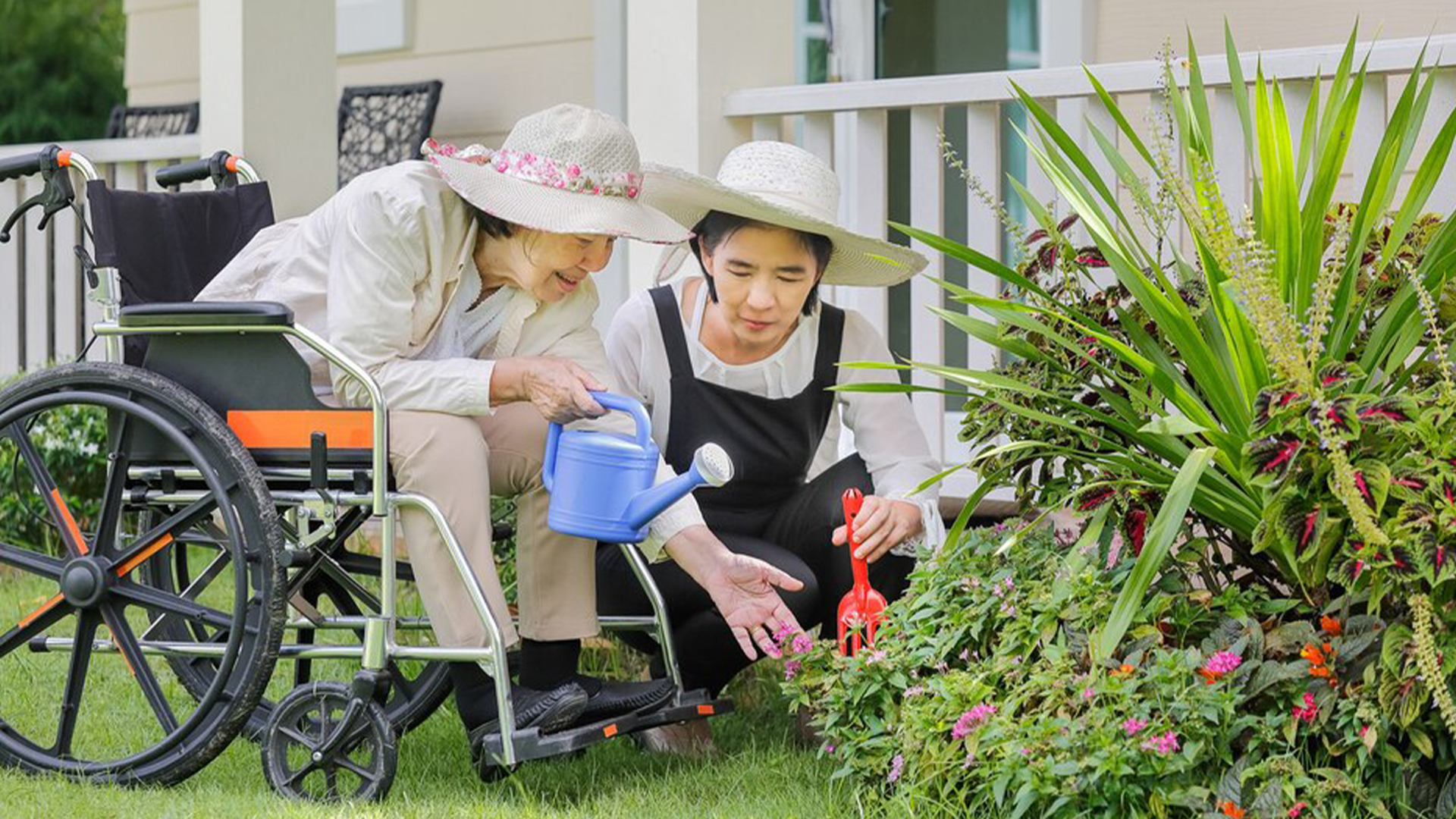Nurturing life from the soil has always been your sanctuary, where the rhythm of nature’s heartbeat syncs with your own. The NDIS Gardening Services Adelaide is like a magical key, unlocking the gate to a garden of endless possibilities.
Their tailored support services transform obstacles into stepping stones, allowing you to sculpt the earth and coax forth vibrant blooms regardless of any physical challenges. From crafting raised beds that stand as monuments to determination to furnishing you with tools that whisper encouragement with every use, the scheme is your accomplice in weaving dreams amidst the petals and leaves.
NDIS and Gardening Services
Through the National Disability Insurance Scheme (NDIS), Australians with disabilities can access subsidised gardening services to make their hobby more accessible.
Gardening Benefits
Gardening provides many benefits for people with disabilities. It encourages outdoor activity and connection with nature, which can help improve mood and mental well-being. Caring for plants also gives a sense of purpose, and nurturing living things can be rewarding.
Services Offered
The NDIS Gardening Services Adelaide provides funding for gardening services like lawn mowing, weeding, pruning, mulching and planting. Help using equipment such as wheelbarrows, trolleys and garden tools adapted for those with limited dexterity are also available. Some services will advise making a garden more accessible,neat, safe and secure by regular maintenance and installing gardening systems etc.
Benefits of Gardening for People With Disabilities
Gardening offers people with disabilities a therapeutic outlet, fostering physical activity and improving motor skills through tasks like planting and watering. Additionally, it promotes mental well-being by providing a sense of accomplishment, connection with nature, and opportunities for relaxation and stress reduction.
Physical and Mental Wellbeing
Gardening provides physical activity and exposure to sunlight, which helps maintain mobility, flexibility and vitamin D levels for people with disabilities. It also leads to the release of endorphins that improve mood and act as natural painkillers. Caring for plants can decrease stress, anxiety and depression, boosting overall well-being.
Social Interaction and Community Building
Community gardens and gardening programs connect people with similar interests, reducing isolation. Sharing gardening tips, tools and harvests with others leads to new friendships and support networks. For people with disabilities facing mobility or communication challenges, these social interactions can be significant.
Purpose and Accomplishment
Nurturing a garden from seed to harvest gives a sense of purpose and achievement. Caring for plants relies on patience and dedication, with the reward of homegrown food or beautiful flowers. This gives people with disabilities an outlet for their skills, talents and time in a productive and rewarding way.
Nutrition and Food Security
Growing your fruits, vegetables, and herbs provides access to nutritious, organic produce. A productive garden can improve food security and offset grocery costs for people on fixed or low incomes. Freshly picked produce also tastes better, encouraging people to eat healthier, homegrown food.
With the NDIS Gardening Services program, gardening is accessible and beneficial for people from all walks of life. Whether tending a small herb garden or a large community plot, people with disabilities can experience the many rewards of connecting to nature in this simple, life-affirming way.
Types of Gardening Services Covered by the NDIS
If you have a disability and difficulty maintaining a garden, the NDIS provides funding for various gardening services to help you continue enjoying the benefits of outdoor spaces.
Lawn Mowing and Garden Maintenance
Mowing the lawn and pruning bushes can be challenging for those with limited mobility or strength. The NDIS covers basic lawn mowing and garden maintenance services to help with mowing, raking leaves, weeding, pruning shrubs, and clearing garden waste. These services aim to make gardening more accessible while allowing you to keep your outdoor space tidy and functional.
Assistive Gardening Tools and Equipment
If you have the motivation to garden but need more physical ability, you may also consider buying specialised gardening tools and equipment to help you get started or continue gardening. Options include ergonomic tools with padded, larger handles that are easier to grip, wheeled gardening stools or seats, and long-handled tools to garden while standing. These tools are designed to reduce strain and make gardening simpler.
The types of gardening NDIS services and the level of funding you receive through the NDIS will depend on your individual needs and circumstances. Speak to your NDIS planner about available gardening supports and which options suit you best so you can continue enjoying the benefits of puttering in your garden. The proper assistance and accommodations can make all the difference in making gardening an accessible and fulfilling activity for people of all abilities.
How to Access Gardening Support Through the NDIS?
Suppose you or a loved one lives with a disability and wants to get into gardening. In that case, the NDIS Gardening Services offer services to help make this dream a reality. The NDIS provides home and community support funding, including adaptive gardening equipment, tools, and services to help you start or maintain a garden.
If you need extra help starting or maintaining a garden, the gardening NDIS may provide funding for gardening services. These services could include lawn mowing and gardening, weeding and pruning assistance, planting and transplanting help, and guidance from gardening mentors. The level of services will depend on your needs and gardening goals.
To access these gardening supports, simply discuss your needs with your NDIS planner, who can help determine your eligibility and approve funding for assessments, equipment, tools, and services. They want you to achieve your goal of an accessible garden, so don’t hesitate to ask about all options available to help you garden as independently as possible. With the right tools and support, you’ll grow your little patch of paradise in no time.
Gardening Accessibility Features to Consider
If you or someone you know has a disability, making gardening more accessible can open up a world of enjoyment. Many features can be incorporated to make gardening easier and safer.
Raised Garden Beds
Raised garden beds elevate the soil so you can garden without bending over or kneeling. They can be built to a height that suits your needs. They also allow for the use of gardening tools like small shovels, trowels, and scooters. For wheelchair users, the beds should be at least 2 to 3 feet high.
Wide Pathways
Create pathways between garden beds and throughout the garden that are at least 4 to 5 feet wide. This may allow easy access for wheelchairs, walkers and scooters. The paths should be level, even and non-slip. Materials like gravel, mulch, concrete or brick pavers work well.
Handrails and Support
Install handrails along pathways and around raised garden beds. They provide support and balance for those with limited mobility and should be 2 to 3 feet high. You can also attach trellises to handrails so vining plants have a sturdy structure to climb.
Adaptive Tools
Many adaptive gardening tools are available, such as trowels, small shovels and rakes with extended handles, scooters for sitting or kneeling, special secateurs and pruning shears, and lightweight hoses. These make gardening easier when mobility or grip strength is limited.
Automatic Watering Systems
Install an automatic watering system with timers to avoid the need for frequent hand watering. Drip irrigation systems, soaker hoses and sprinklers on timers are all excellent options. They provide consistent watering for your garden even when you can’t physically water as often.
With some modifications and special features incorporated, gardening can be made accessible and enjoyable for people of all abilities. Explore options with your local gardening centre or disability services to determine what will work best based on your needs. The rewards of gardening are open to everyone.
Conclusion
So there you have it. With the help of NDIS Gardening Services Adelaide, which is tailored to your needs, you can reap all the benefits of gardening.
A sense of purpose, relaxation, connection with nature, and the satisfaction of growing your food are all within reach. It may take some work to find the right program and make adaptations, but the payoff can be huge for your physical and mental well-being.
Embrace the garden, your canvas of dreams, with My Life My Way, your partner in unlocking the boundless joys of gardening through NDIS services. Together, we sculpt landscapes where barriers dissolve and abilities flourish. Join us as we redefine what’s possible, one blossom at a time.



